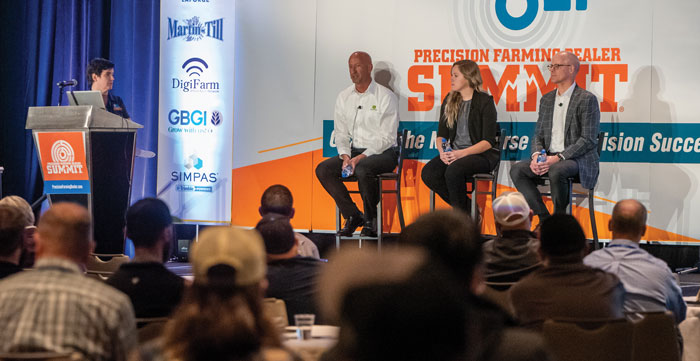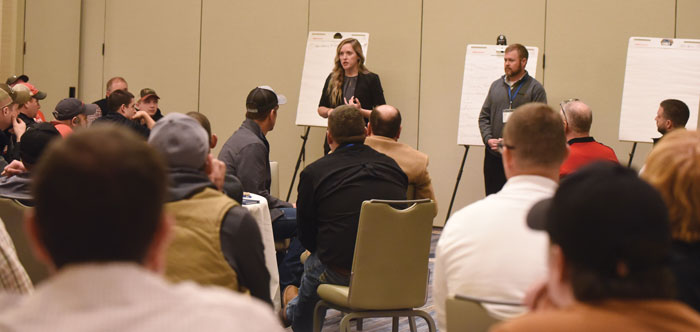AGCO, Case IH and John Deere leaders jumped at the chance to address elite precision dealers during the first ever OEM panel discussion at the Precision Farming Dealer Summit in St. Louis, Mo.
Seth Crawford, AGCO senior vice president and general manager, precision ag and digital, Kendal Quandahl, Case IH precision technology marketing manager for North America, and Matt Olson, manager of precision ag go-to-market for John Deere, fielded questions about their strategic direction for business, new technologies and outlook on autonomy. Here are some highlights from the discussion.
Q: Let’s talk about what makes the stars stand out. What do your top performing precision ag dealers do differently from the average ones in your network?
Olson: We’re really working together with our dealer partners to make sure that everyone within their dealership can tell the story of precision ag and play their role in supporting precision ag for the customer. When we look at the number of customers we’re impacting, the integrated solutions department can no longer be successful at the scale we’re at. I think scalability is key.
The second piece is we really need to make sure that we’ve got a consultative relationship with the customer so that we’re understanding their needs, goals and challenges. Those are the two hot buttons for me relative to how you differentiate yourself from the herd.
Quandahl: One thing that really separates certain dealers from others is their level of understanding that precision is no longer a standalone business — they’ve incorporated it into every aspect of the dealership. If we continue to have only 1 precision specialist per 3 or 4 stores, we don’t retain them very long.
Another philosophy embraced by dealerships that are excelling is “get comfortable being uncomfortable.” It’s those who have taken the opportunity to say, “We’re going to build a video series for our customers.” Nobody wants to be on camera, but people who take the time to say, “I’ve found this issue and I don’t have a resource for my customers, so I’m going to make it,” are the ones who stand out.
Crawford: They do a lot in the offseason. They don’t wait for the heat of the planting season or harvesting. Our successful dealers are doing the offseason clinics and taking time to help farmers get set up for a flawless planting season.
Successful dealers also find good ways to charge for the product. If you’re not out there pitching the details about what you’re going to do to help them be successful with their precision farming endeavors, then you’re missing a golden opportunity. Make sure you’re getting the money up front, and then follow through and deliver that service to earn the return business from the farmer.
 John Deere’s Matt Olson, Case IH’s Kendal Quandahl and AGCO’s Seth Crawford join Farm Equipment Executive Editor Kim Schmidt on stage for the first ever OEM panel discussion at the Precision Farming Dealer Summit in St. Louis, Mo.
Image Michaela Paukner
John Deere’s Matt Olson, Case IH’s Kendal Quandahl and AGCO’s Seth Crawford join Farm Equipment Executive Editor Kim Schmidt on stage for the first ever OEM panel discussion at the Precision Farming Dealer Summit in St. Louis, Mo.
Image Michaela Paukner
Q: What does the new executive management at your company see that is different about precision ag today than 3 years ago?
Crawford: Buying Precision Planting in 2017 was a major shift as we truly understood what was possible with the retrofit business. Now, with our CEO Eric Hansotia leading the way, we’ve made precision agriculture the core of our business. We lead with precision ag, and the equipment business follows.
Quandahl: All farming is precision farming. That is the philosophy being carried all the way down through our organization — if we are going to be a tech-first company, we need to make sure that we invest in technology.
Olson: We’ve been in precision ag for a long time, so we know the importance of it to our customers. I think we are now reaping the benefits of not only the history that we have, but our ability to stay on top when it comes to being able to make sure that precision ag is our focus and that we’re doing the best for our customers and dealers.
“When we look at the number of customers we’re impacting, the integrated solutions department can no longer be successful at the scale we’re at…”
Q: What initiatives have been put into play at the manufacturer level — products or programs — that should increase the effectiveness, efficiency and economic viability of precision ag support to the customer?
Quandahl: One thing we’re really excited about from a Case IH perspective is the change in our support model. We’re launching a completely new precision support model based on region breakouts. Now, when you make a phone call, you’re talking to someone who is an expert in your region’s farming practices, whereas in the past our central call area was based in Racine, Wis. This will be fully in play for spring 2023.
Olson: We have a call center that we staff after hours. So, if your dealer can’t support you at 3 a.m., there is a staff of John Deere people there to provide support. Our dealers are first and foremost our biggest differentiator — we’re truly committed to that, and we’re going to make sure that we back them up when they need to have some balance in their lives and maybe a little bit of sleep.
Crawford: We introduced the Precision Ag Line (PAL) a couple years ago. It’s the backstop when there are questions that can’t be answered at the local level. The next level is made up of our support specialists, and we continue to see increased engagement and subscriptions from our dealers who see how valuable it is. I think farmers are better supported than they’ve ever been with these hybrid models we’re all talking about.
Majors Weigh in on Right to Repair
Matt Olson (Deere): We’re proud to make sure that we maintain a leadership position relative to allowing customers the ability to maintain and repair their equipment. By signing the memorandum of understanding, it allows us to make sure that we’re very transparent and working together with the industry to support the needs of our farmers. We think our dealers have a true differentiating value proposition for support, but the journey conversation that we’ve been having for most of this hour is that every farm’s different.
Kendal Quandahl (Case IH): If somebody wants to work on their own equipment, that’s OK. We want to make sure that they have accessibility to those special tools they need. But at the same time, we want to make sure that we keep the local dealership engaged with that customer. So when a customer does make a request to access our service tools, that’s something that also gets sent to that local dealership so that way they’re still there to support that customer.
Seth Crawford (AGCO): 50-60% of the service parts that are sold are actually sold over the counter, and about half or less go through the service departments at the dealerships. So, it’s not like it’s been a captive business and it’s trying to be pried away. There has always been a mix of farmers who do the work themselves — maybe they’re contracting with an independent technician, or they’re doing it through the shop.
I remember my territory days many years ago, going in and having a service manager on the phone for 20 minutes, walking a customer through a repair of one of their lowest priced machines. And you think about the value of that service technician’s time. What can we do if we automate the help, whether it’s a self-help video or something where we can diagnose it automatically and fix it? Let’s make sure that your technicians can work on the highest value stuff where farmers really demand your service. We’re going to try to make it as automated as possible and for sure keep you in the mix all the way long.
Q:The ag industry was reshaped when we went from horse and plow to tractor. What are your thoughts on how fully autonomous machines are going to reshape agriculture?
Quandahl: I think if we do this right, collectively as a whole, we won’t notice because we took everybody one step at a time to deliver the solutions they’re asking for. Then in 5-10 years we’ll look back and say, “Man, we had to do that?” If we’re all invested in the autonomy journey, we won’t even be realizing that it’s happening.
 During the 2023 Precision Farming Dealer Summit, Case IH held the first-ever, private brand meeting for its dealers at the end of day 1. The meeting included an open dialog and exchange on a variety of precision topics and programs between dealers and Case IH representatives.
Image Michaela Paukner
During the 2023 Precision Farming Dealer Summit, Case IH held the first-ever, private brand meeting for its dealers at the end of day 1. The meeting included an open dialog and exchange on a variety of precision topics and programs between dealers and Case IH representatives.
Image Michaela Paukner
Crawford: How is it changing our business internally with everything that’s going on? I could tell you for sure that we’re hiring a lot more software engineers, robotics engineers, sensors and perception engineers than we’ve ever hired in our past. And we’re hiring as a percentage now fewer mechanical engineers. That will reshape how the products are brought out and developed.
The other piece is being able to unlock features after the sale. Traditionally you sold a tractor and that’s the way it stayed for the life of it. What’s really a neat opportunity is you might sell a tractor or combine today, and over time we’re going to be able to unlock more features more easily than we’ve ever been able to do before, enhancing the value of the machine.
Olson: Our key thing is making sure that we’re understanding the value that’s created for the customer and making sure they retain the greatest share of that. But then we look at sharing some of that value with our dealers and for us as a business.
Outside of the work that is done, it should be pretty seamless because we’ve talked a lot about being on this journey to autonomy for a long time, and now we’re just getting to the point where we say, “Get out of the cab, you don’t need to be in there.” When you look at technology, software and maintenance — that’s a huge investment that we must make, and in a lot of cases you can’t sell that once and be able to support that for the rest of the machine’s life.







